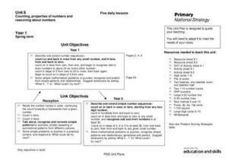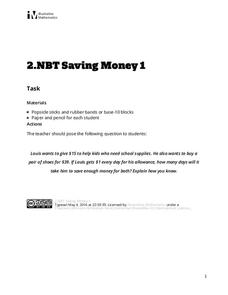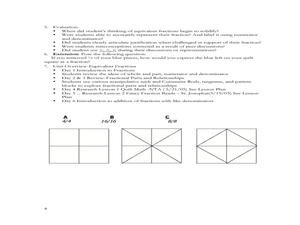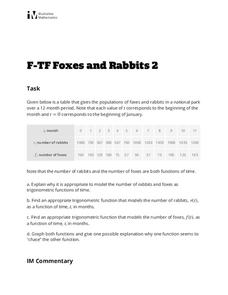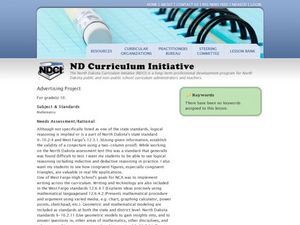Florida Center for Instructional Technology
A Human Number Line: Teacher Notes
Twenty-one pieces of tagboard can lead your class to a greater understanding of integers when you use them to form a human number line. After creating this math tool, two strategies for adding and subtracting will have your...
Curated OER
Which is Closer to 1?
A seemingly simple question that reveals a lot about a student's understanding of fractions. In finding an answer, learners compare fractions with different denominators that are both greater and less than one. No number line is...
Curated OER
Counting, Properties of Numbers, and Reasoning about Numbers
Five days of lessons develop number sense and counting patterns, including odd and even numbers, 5s and 10s, doubles, and ways to make 10. Each session opens with fun finger play to reinforce counting and reasoning about numbers. Various...
American Statistical Association
Happy Birthday to . . . Two?
How many people do you need in a room before two likely share the same birthday? Scholars consider this puzzle by analyzing a set of data. They ponder how to divide the data and determine the proper size of a group for this event to...
Curated OER
Inductive and Deductive Reasoning
Students use logical arguments and inductive reasoning to make or disprove conjectures. After observing a teacher led demonstration, students discover that the deductive process narrows facts to a few possible conclusions. In groups,...
Montana Office of Public Instruction
Native American Culture: Counting, 1:1 Correspondence
Kindergarteners practice showing 1:1 correspondence while incorporating information they learned about a local Native American culture. The objects used for counting are taken from the previous day's Native American lesson. The intention...
Curated OER
Introduce Double-Digit Addition
Students generate a list of numbers then classify them into groups of single digit and double-digit numbers. After listening to a children's book about double-digit addition, they work with tens and ones blocks to solve double-digit...
Illustrative Mathematics
Saving Money 1
How many days will it take Louis to save enough money for school supplies and new pair of shoes? Focus on Common Core math standards with a two-part task that involves a word problem and counting manipulatives.
K-5 Math Teaching Resources
Show Your Work Recording Paper
"Show your work!" It's the math teacher's mantra. Support your class with meeting this reasonable requirement with this set of recording paper templates.
Curated OER
Half Math Quilt
Help your third graders become familiar with equivalent fractions for one-half by having them create a quilt. They will use triangles to create a quilt of equivalent fractions over a period of 6 days. As they create the quilt pieces they...
Math Stars
Math Stars: a Problem-Solving Newsletter Grade 7
Put on your thinking caps because middle school math has never been more interesting in this huge resource full of thought provoking questions. Written as a newsletter, the resource has 10 two-page newsletters with a variety of...
Illustrative Mathematics
Kimi and Jordan
A single activity gets your math class to solve a word problem using two linear equations and two variables. They compare the summer earnings of Kimi and Jordan and then graph the solutions to determine who will save the most money in a...
Mathed Up!
Shading Fractions of Rectangles
Learners find the midpoint between two numbers, shade fractional amounts of rectangles as well as decimal amounts of rectangles, and explain their mathematical reasoning in words. The assessment is a great way to check for understanding...
Curated OER
Add It Up In Number Ville! Adding 2-Digit Numbers With and Without Regrouping
Students explore adding 2-digit numbers. In this math lesson, students identify 2-digit numbers and use base ten blocks to practice adding. Students use addition to break a code.
Curated OER
Foxes and Rabbits 2
Explore the relationship between the population of foxes and rabbits in a national park using trigonometric models. Plot data and find the appropriate trigonometric functions. Two questions require interpretation and explanation of...
Illustrative Mathematics
Growing Bean Plants (Grade 2)
After planting a bean seed in a jar, young scientists observe the growth patterns over several days. As the bean becomes a sprout, and the sprout becomes a plant, partners measure and plot the data. They notice patterns, practice...
Math Stars
Math Stars: A Problem-Solving Newsletter Grade 6
Think, question, brainstorm, and make your way through a newsletter full of puzzles and word problems. The resource includes 10 different newsletters, all with interesting problems, to give class members an out-of-the box...
University of Utah
Explore Proportional and Linear Relationships
Progress from proportional relationships to linear functions. Pupils first review concepts of proportionality covered in earlier grades. They then extend these concepts to linear functions, such as determining the slope of a...
Illustrative Mathematics
Proportional Relationships, Lines, and Linear Equations
The resource is a good introduction to what makes a proportional relationship between two lines. Discuss the similarities of both lines and the possibility of intersection. Use this opportunity to list other acceptable forms of each...
Illustrative Mathematics
Rectangle Perimeter 2
While this activity is centered around expressions that represent the perimeter of a rectangle, it also hits at the fundamental concept of equivalent expressions, simplifing expressions, and like-terms. Classmates express their...
Curated OER
Math computation
The lesson says it is intended for 4th grade but it is suitable for grades 1-3 as well. The class discusses what it means to add, the commutative property of addition, and mathematical reasoning. This is an exercise in number sense,...
Curated OER
One Good Turn Deserves Another
Students make observations about shapes and 1-, 2-, and 3-dimensional objects. They conduct observations and make predictions regarding transformations of simple geometric shapes. They identify shapes that occur in household items.
Curated OER
Probability and Statistics
Students reason mathematically as they solve problems dealing with probability of an even occurring. In this probability lesson, students differentiate between different rankings of candidates running for leadership. They identify...
Curated OER
Deductive and Inductive Reasoning
Students differentiate between inductive and deductive reasoning. In this geometry lesson, students identify congruent figures and examine logos for congruency.




